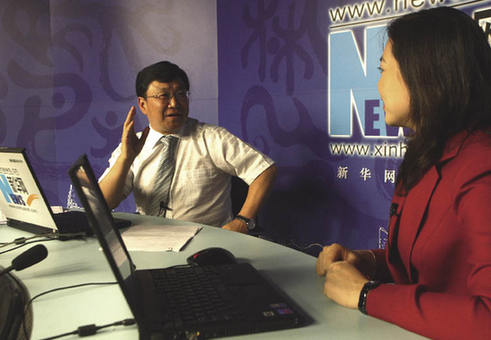|
Government officials browsing the Internet to exchange opinions with netizens is a new phenomenon in the Chinese political arena. It is a trend for administrative officials at various levels to conduct online dialogue with netizens, open blogs and e-mail accounts. The People's Daily, an organ of the Central Committee of the Chinese Communist Party, carried an editorial in 2007, entitled "2007, Listening to Chinese Netizens." In the editorial it concluded that Chinese netizens have become an important force in promoting democratic building.
New Platform of Public Supervision
 |
| Deputy Mayor Tan Qiwei of Chongqing answers questions concerning local tourism during an online interview on July 15, 2008. |
In 2008, the role of supervision played by the Internet saw unprecedentedly excellent performance. It is no longer a difficult thing to supervise officials. Certain officials lost their positions because of Internet exposure. Ma Wen, chief of the China National Bureau of Corruption Prevention, said, "The discipline and supervision departments have assigned personnel to collect clues about corruption from the Internet every day."
Liu Suhua, an associate professor of the Party School of the CPC Central Committee, said, "The Internet is promoting the functional change of the government, and netizens have become a strong force making officials' misfeasance inescapable."
On December 11, 2008, a netizen published an article entitled "Investigating Zhou Jiugeng, Director of the Housing Administrative Bureau of Jiangning District, Nanjing City" on Cat898.com, calling on netizens to investigate this government official. Another netizen published an article entitled "Bureau Chief Zhou Jiugeng Smokes Luxurious Cigarettes and Wears Luxurious Wristwatch" on the Internet. From a news photo the netizen discovered that the Constantin-brand wristwatch Zhou Jiugeng wears is priced at RMB 100,000.
On February 9, 2009, the municipal commission of discipline inspection of Nanjing established a special group in charge of this case. Through investigation, the group initially grasped Zhou Jiugeng's corruption, whose embezzlement and acceptance of bribes amounted to RMB 2 million. Zhu Shanlu, secretary of the Nanjing municipal committee of the Chinese Communist Party, has reiterated repeatedly, "Party members and cadres must stand the test of Internet supervision." With the rapid emergence of the Internet, every action of the Party leaders and government officials are under the supervision of the broad masses of the people.
A few weeks later, an anonymous netizen published a report and related receipts of travel on public expenses he found in a Shanghai subway station. From these receipts one can judge that several government officials conducted extravagant travels in the United States and Canada on public money. This has aroused discussions among netizens. After investigation, two officials were removed from their posts and others were also punished accordingly.
Lawyer Hao Jingsong, director of the Beijing Judicial Public Welfare Research Center, said that the channels through which the masses supervise government officials are limited. Netizens conducting "human flesh" searches are exercising their right of supervision endowed by the Constitution.
Hu Yong, a professor with the School of Press and Communication of Peking University, cautioned, "We should not overestimate the functions of Internet opinions." About 70 percent of the Internet users in China are under the age of 30, and have a strong appetite for news and entertainment. In his book entitled Mass Vociferance (Zhongsheng Xuanhua) he wrote, "At present, the Internet is still at a stage of expression, or so-called 'mass vociferance.' It is no more than a stage of expression, when even consensus is out of the question, let alone any action." |
